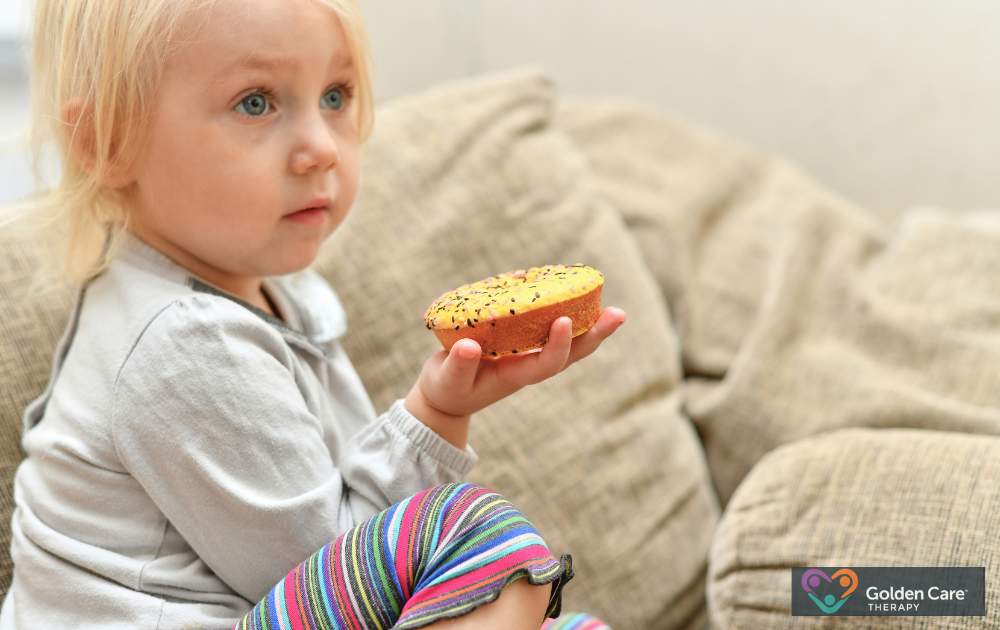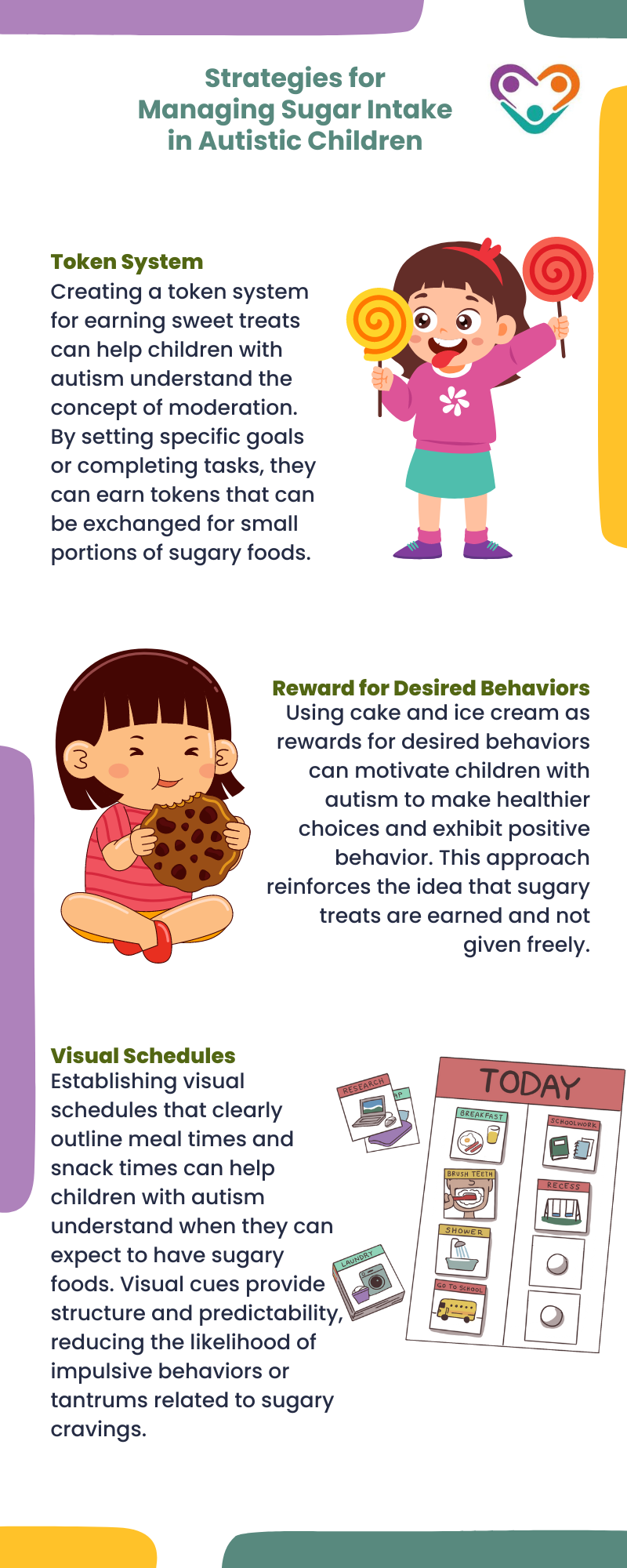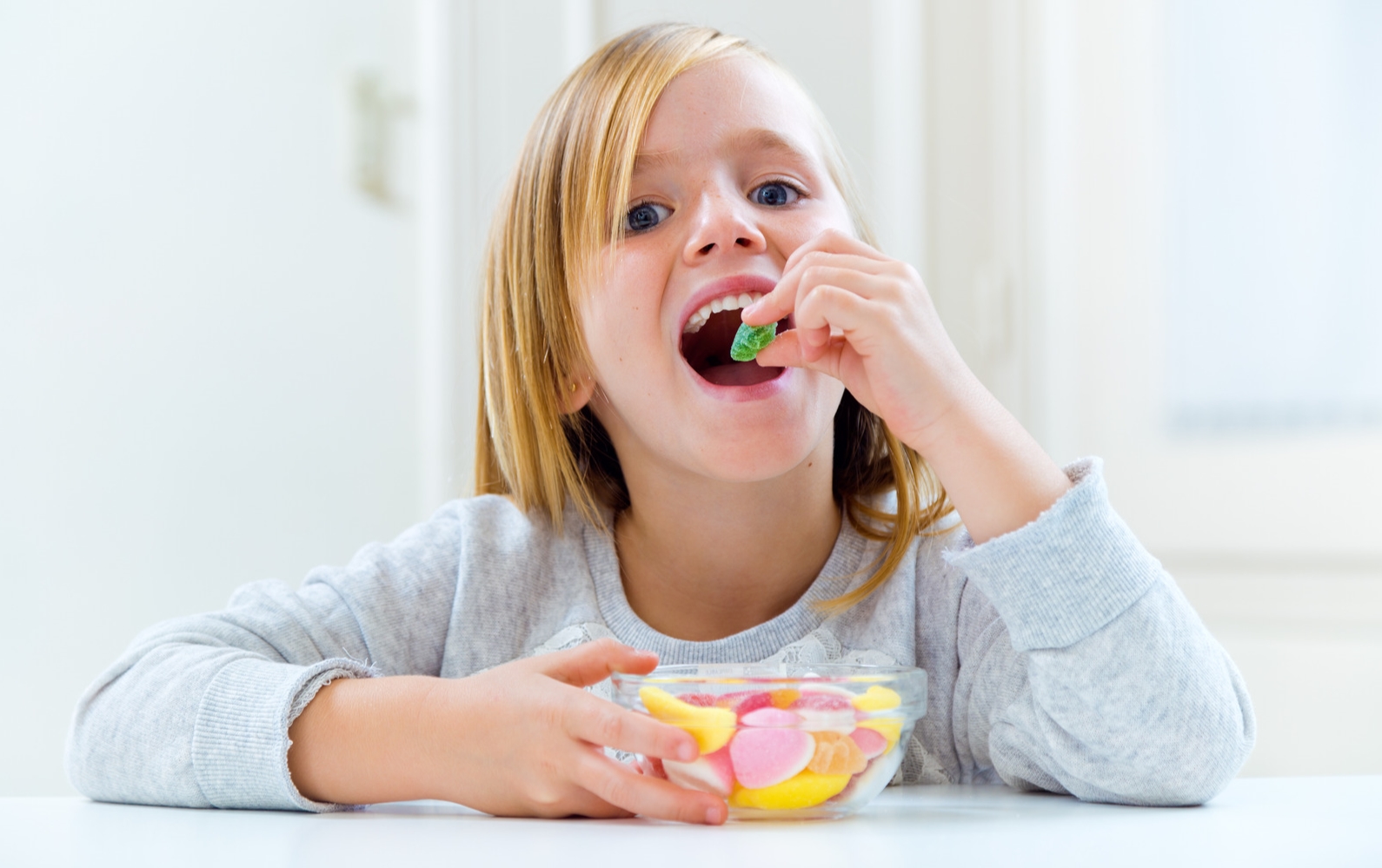Many individuals affected by autism exhibit unique sensory responses to food. Some may avoid certain flavors, food textures, or colors, while others may have strong cravings for specific food types such as pasta or bread.
These sensory preferences or aversions can be attributed to their hypo- or hyper-responsiveness to sensory input, including the sensory characteristics of food.
There are also those who strongly prefer sugar or sweets. In this article, we’ll look at the connection between sweet and sugary foods and autism.

Impact of Sugar on Neurotransmitters
According to research, there is a correlation between sugar intake and autism symptoms, primarily due to the impact of sugar on neurotransmitters in the body. Neurotransmitters are chemical messengers that facilitate communication between nerve cells in the brain.
Excessive sugar consumption can disrupt the balance of neurotransmitters, potentially affecting behavior and cognitive function.
Excessive sugar consumption can lead to increased inflammation in the body. While inflammation is the body’s natural response to injury or illness, chronic inflammation can have negative effects on overall health. In individuals with autism, inflammation may contribute to the manifestation of symptoms such as sensory sensitivities and behavioral challenges.
Furthermore, sugar can negatively impact brain function and development. It can cause systemic inflammation and disrupt the production of neurotransmitters, leading to cognitive issues. By reducing sugar intake, better brain function and development can be supported.
Dietary changes can be implemented to improve overall well-being, especially for autistic individuals. Reducing processed foods and sugars while increasing the intake of prebiotics and fibers can potentially reduce sugar cravings, aid in making long-term lifestyle changes, and improve overall health.
These changes can also have a positive impact on brain function and development by reducing systemic inflammation and disruptions in neurotransmitter production caused by sugar intake.
Improving gut health is another important aspect to consider. The gut produces GLP-1 (glucagon-like peptide 1), a hormone that helps regulate blood sugar levels and control appetite. By promoting the production of GLP-1, gut health can help reduce sugar addiction.
Probiotics that produce butyrate, such as Akkermansia, and supplements like Butyrate can stimulate GLP-1 production, balance blood sugar, reduce appetite, and improve overall health.

The Relationship Between Sugar and Autism
Understanding the relationship between sugar and autism is a complex topic that requires careful examination.
While there is no direct causal link between sugar consumption and autism, there are several factors that suggest a potential relationship.
Disrupted Gut Flora
Studies have shown that children with autism may have altered gut flora which can contribute to sugar cravings and potentially impact behavior. Gut health plays a crucial role in overall well-being, including brain function and immune system regulation.
Disruptions in gut health can lead to imbalances in the body, potentially exacerbating autism symptoms.
Inflammation
Excessive sugar consumption can lead to increased inflammation in the body. Inflammation is the body’s natural response to injury or illness, but chronic inflammation can have negative effects on overall health. In individuals with autism, inflammation may contribute to the manifestation of symptoms such as sensory sensitivities and behavioral challenges.
Glucose Metabolism
Studies have found that individuals with autism spectrum disorder (ASD) may exhibit lower blood sugar levels and decreased glycemic measures compared to typically developing individuals. These findings suggest a potential association between sugar metabolism and ASD.
The alterations in glucose metabolism or insulin resistance observed in individuals with ASD may contribute to the development of behavioral symptoms often observed in ASD.

Exploring Sugar and Behavioral Effects
In order to further understand the relationship between sugar and autism, we should explore the potential behavioral effects that sugar intake may have on individuals with autism.
While research in this area is ongoing, there are a few key aspects to consider, namely:
Sugar Intake and Hyperactivity
One common concern is whether sugar intake can contribute to hyperactivity in individuals with autism.
Research concluded that there is no direct connection between sugar intake and hyperactivity in children. However, it’s important to note that every individual is different, and some children with autism may have unique responses to sugar.
While sugar may not be a direct cause of hyperactivity, it’s worth considering the overall impact of a high-sugar diet on the behavior and well-being of individuals with autism. Consuming excessive amounts of sugar can lead to energy fluctuations and affect overall mood and behavior.
Therefore, it is generally recommended to maintain a balanced and healthy diet for individuals with autism, which includes moderate sugar intake.
Sensitivities to Casein and Gluten
Children with autism may react differently to foods compared to typically developing children. Some individuals with autism may have sensitivities or intolerances to certain substances, such as casein (found in milk) and gluten (found in grain products).
Casein and gluten sensitivities can manifest in various ways, including changes in behavior. It is important to consult with a doctor or healthcare professional to determine if a child with autism has an allergy or intolerance to substances like casein and gluten.
Identifying and managing these sensitivities can potentially improve behavior and overall well-being.
Elimination diets, such as a gluten-free or casein-free diet, are sometimes recommended for individuals with autism who have demonstrated sensitivities or intolerances.
These dietary changes should be done under the guidance and supervision of a healthcare professional or registered dietitian to ensure proper nutrition and to avoid any potential deficiencies.
It’s worth noting that not all individuals with autism have sensitivities to casein or gluten. Each person’s dietary needs and sensitivities may vary, so it’s important to work with healthcare professionals to determine the best approach for managing sugar intake and addressing any potential behavioral effects.

How to Manage Sugar Intake in Children with Autism
Parents and caregivers should develop effective strategies that promote healthy eating habits and behavior in order to manage sugar intake in their autistic children.
There are several effective strategies to pull this off. Let’s look at each of them.
Proactive Strategies
Proactive strategies play a crucial role in managing sugar intake in children with autism. These strategies focus on creating a supportive environment and setting up systems that encourage positive behavior and healthy food choices.
Here are some proactive strategies that you want to consider:

Reactive Strategies
Reactive strategies are helpful in addressing immediate situations when a child with autism’s behavior becomes challenging due to a desire for sugary foods. These strategies focus on teaching appropriate behavior and providing alternatives when sugary treats are not suitable.
Some reactive strategies include:
- Withholding Treats – If a child starts screaming and crying for sugary treats, it may be necessary to withhold the treat as a consequence of inappropriate behavior. This approach helps children with autism understand that their actions have consequences and that they need to exhibit appropriate behavior to receive the desired treat.
- Offering Alternatives – When sugary treats are not an option, offering alternative options can help redirect the child’s focus. Providing healthier snacks or engaging in enjoyable activities can help distract from the desire for sugary foods and reduce the intensity of the reaction. Prompting them to drink enough water is a useful alternative for keeping their sugary cravings in check as well.
Setting Boundaries and Expectations
Setting boundaries and expectations is essential for managing sugar intake in children with autism. Clear communication and consistent enforcement of rules help children understand the limits and manage their expectations around consuming sugary foods.
Here are some strategies for setting boundaries and expectations:
- Providing Warnings – Giving children with autism warnings about the quantity of treats they will receive can help manage their expectations and prepare them for the amount of sugary food they can consume. This approach helps prevent sudden disappointment or frustration.
- Offering Alternatives – When sugary foods are not an option, offering alternative choices can help children with autism understand that there are other options available. Providing healthier snacks or non-food rewards can help redirect their focus and reinforce appropriate behavior.
- Staying Firm – It’s important to stay firm on decisions related to food choices. Consistently enforcing the established boundaries helps children with autism understand that the rules are non-negotiable and promotes healthier eating habits in the long run.
By implementing proactive and reactive strategies, as well as setting boundaries and expectations, parents and caregivers can effectively manage sugar intake in children with autism.
These strategies not only promote healthier eating habits but also help children develop appropriate behavior and responses when it comes to making food choices.
Research continues to shed light on the neurological basis of sensory issues in autism, offering hope for more targeted and effective therapies in the future. By recognizing and addressing sensory processing difficulties, we can improve the quality of life for individuals with autism and their families. If you’re seeking specialized ABA therapy in New Jersey, Indiana, Georgia, and New York, Golden Care offers comprehensive services tailored to meet the unique needs of each individual. Contact us to learn more or book a consultation today.
Sources:
https://www.autismspeaks.org/sugar-and-autism
https://www.goldstarrehab.com/parent-resources/sugar-and-autism-correlation
https://www.naturalautismsupport.com/blog/autism-and-sugar-cravings
https://www.autismparentingmagazine.com/sugary-foods-children-autism-hyperactive



